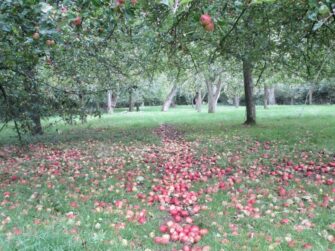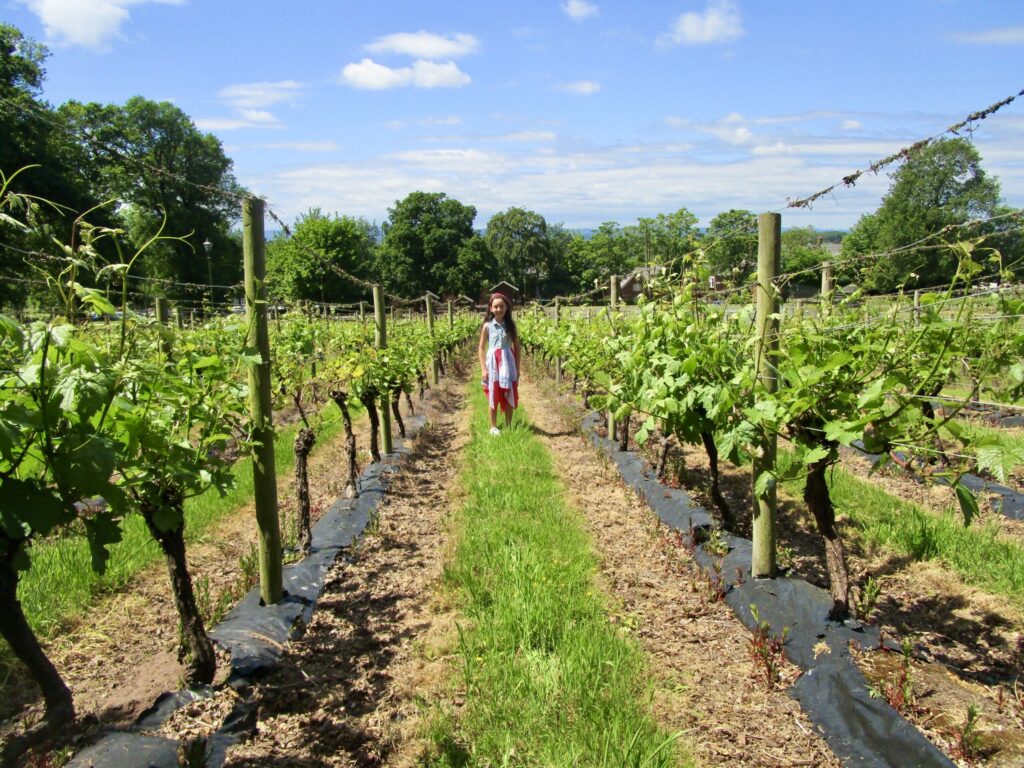James Marsden is keen to introduce me to Big Mama.
She stands tall in the middle of a restored orchard, looking good for her 300 years, with her mother-tree branches heaving under the bounty of late-harvest perry pears.
I’ve joined James to gather the harvest by hand in Gregg’s Pit orchard, located near Ledbury.
The harvest [pictured above] starts in late September and, depending on the weather, lasts four to six weeks.
Herefordshire is the historical centre of Britain’s cider-making industry — and is in rude health given the renaissance of cider as a premium, organic product.
UK cider represents 45 per cent of the global cider market with orchards generating over £33m annually, according to The National Association of Cider Makers (NACM).
‘It’s labour-intensive work,’ says James, ‘but I work with nature, using the sun to influence the sugars.’
Historic connections
Cider has been produced in Herefordshire since the medieval period with references to ‘sidir’, meaning ‘a strong drink’ found in the 1420 Wycliff Bible at Hereford Cathedral.
As cider challenged wine in fashionable circles during the 17th century, most Herefordshire farmhouses installed grindstones to press the Herefordshire Redstreak apples popularised by the area’s cider pioneer, Lord Scudamore.
Today the region remains the largest cider-producing county in the UK with around 20,000 acres under orchard, growing high-quality cider apples and perry pears.
I set out on an autumnal morning, the countryside dappled with spotlight sunbeams and bursting with ripe fruit, to explore the southern Redstreak Cider Circuit, a self-guided tour of the region’s apple-harvest heritage between Ledbury and Ross-on-Wye.
There’s also a Newton Wonder trail, a northern loop around Hereford, with both 45-mile circuits making for a gentle weekend exploring by bike or car.
The southern circuit pivots around the village of Much Marcle, with its 14th-century church dedicated to Saint Bartholomew.
It’s also home to both Gregg’s Pit and Westons Cider, the latter selling brands like Stowford Press and exporting to 40 countries.
Westons is the new face of the cider business: modern, large-scale and based around a visitor centre with a family restaurant.
I join the tour, poking my head into the distillery where huge wooden vats groan under the weight of fermenting fruit, and the visitors’ centre, which explains the history of British cider through historic cider bottles and labels.
Country roads
I later drive on along the country B-roads, the circuit leading me through villages made up of black-and-white buildings.
Many of the cider and perry producers on the circuit welcome visitors for orchard tours followed by an al-fresco or farm-barn tasting. Local cafes, restaurants and hotels, meanwhile, offer apple-themed menus throughout the harvest season.
Orchards have been part of Herefordshire’s landscape throughout history but while some producers have scaled up for the mass market, there are plenty of small-scale operators rediscovering the region’s organic cider-making origins.
Back at nearby Gregg’s Pit, I find James on his hands and knees, collecting pears with a headtorch as the light fades.
He makes a small volume of single-variety and blended ciders and perry drinks each year, using pure fruit juice and traditional methods, including a stone press in his garden.
When I pop my head around the door of the Vat House, the heady waft means the fermentation process is in full swing.
James, who is fond of cooking up an autumnal bean stew using Toulouse sausages and cider:
‘I’m trying to create a complex, distinctive drink and see it primarily as a food-pairing product.’
‘Herefordshire feels deep rural and that’s why I’ve made it my home,’ he adds as we sit in the back garden, the sun setting over the fields overlooking May Hill and the Cotswolds, with a glass of méthode champenoise bottle-fermented perry.
Cheers.
* This story first appeared in the Daily Mail.
- Liked this? Try also Apple harvest in Herefordshire.
- Sign up to my new newsletter, Hit the North, for more travel news and inspiration from my home patch

